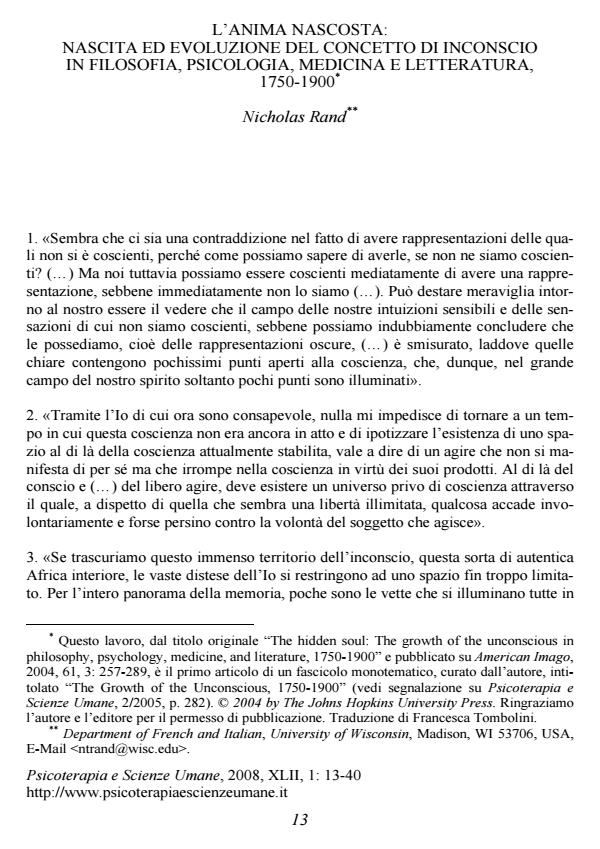L'anima nascosta: nascita ed evoluzione del concetto di inconscio in filosofia, psicologia, medicina e letteratura, 1750-1900
Titolo Rivista PSICOTERAPIA E SCIENZE UMANE
Autori/Curatori Nicholas Rand
Anno di pubblicazione 2008 Fascicolo 2008/1
Lingua Italiano Numero pagine 28 P. 13-40 Dimensione file 198 KB
DOI
Il DOI è il codice a barre della proprietà intellettuale: per saperne di più
clicca qui
Qui sotto puoi vedere in anteprima la prima pagina di questo articolo.
Se questo articolo ti interessa, lo puoi acquistare (e scaricare in formato pdf) seguendo le facili indicazioni per acquistare il download credit. Acquista Download Credits per scaricare questo Articolo in formato PDF

FrancoAngeli è membro della Publishers International Linking Association, Inc (PILA)associazione indipendente e non profit per facilitare (attraverso i servizi tecnologici implementati da CrossRef.org) l’accesso degli studiosi ai contenuti digitali nelle pubblicazioni professionali e scientifiche
The author traces the growth of the unconscious in philosophy, psychology, medicine, and literature from 1750 to 1900, touching on the contributions of Leibniz, Locke, Maine de Biran, Johann Friedrich Herbart, and Jean-Paul Richter. He then gives conceptual preambles to the following seven historical articles published in a special issue of American Imago (no. 3/2004) titled The Growth of the Unconscious, 1750-1900: Johann George Sulzer: Unconscious prejudice and its elimination (1759); Dugald Stewart: Free association in waking and dreaming (1792); Jacob Bernays: Aristotle’s theory of medical catharsis for the soul and the origins of the talking cure (1857); John Daniel Morell and automatic or preconscious mental activity (1862); Eneas Sweetland Dallas and the creative power of the hidden soul (1866); Francis Galton and the investigation of the unconscious through free association (1879); Harald Höffding’s synthesis of the role of the unconscious in psychology (1881). [KEY WORDS: unconscious, history, psychology, catharsis, aesthetics]
Nicholas Rand, L'anima nascosta: nascita ed evoluzione del concetto di inconscio in filosofia, psicologia, medicina e letteratura, 1750-1900 in "PSICOTERAPIA E SCIENZE UMANE" 1/2008, pp 13-40, DOI: